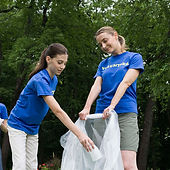Promoting Safe, Stable Nurturing Relationships and Environments
As we think about violence prevention at ICADV, we are excited about all of the possibilities for action. As parents, siblings, colleagues, teachers, mentors, uncles & aunts, godparents, grandparents, partners, kids, supervisors, mentors, business owners, legislators, neighbors, etc, we each have the power and lots of opportunities to increase the goodness that goes on around us. We know that all of the small moments of care that we show add up. They influence our kids and inspire the people around us. The compassion that we share in the small moments helps to keep our families safe and our communities to thrive.
We all have a role to play in the safety and health of our communities! Scroll down to see some examples of ways to increase safe, stable nurturing environments and relationships, testimony from prevention community members about the small moments that have touched their lives, and examples of communities in action to increase safe, stable nurturing environments and relationshipsfor all of their residents.

Parents and Caregivers
-
Tell your children about your love for them often.
-
Show consistency in disciplinary consequences when your kids get it wrong.
-
Listen to your children and value their perspectives and opinions.
-
Model respectful behaviors in your relationships with your children, but also with neighbors, friends and colleagues.

Family and Friends
-
Help reduce parental stress by offering your time and talents in support of the families that you care about.
-
Notice and appreciate the great qualities that you see in the kids in your life.

Businesses
-
Provide regular, consistent scheduling for all employees.
-
Adopt workplace policies that are responsive to families’ needs. Ideas could include offering sick leave, paid family leave, and providing private space and time to allow mothers to breastfeed or pump their breast milk.

Service Organizations
-
Review organizational policies and practices to identify new ways to empower, connect and support families. Regularly checking in with the families that you serve is a great way to get new ideas for increasing SSNREs within your program.
-
Work to ensure the accessibility of services for all community members. This may include things like modifying the hours of service, ensuring accessibility within your space, and taking steps to identify and address any community stigma related to utilizing agency programs.

Policy Makers
-
Talk with community members about families’ experiences and needs.
-
Prioritize programs and policies that support families in your legislative agenda. Examples include investment in public schools, paid family leave, high quality early learning programs and the social safety net for families.
